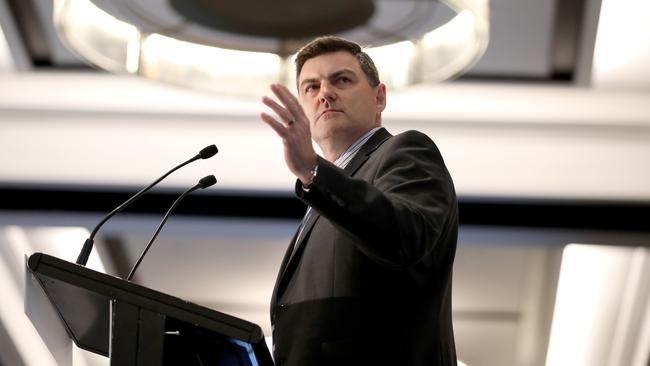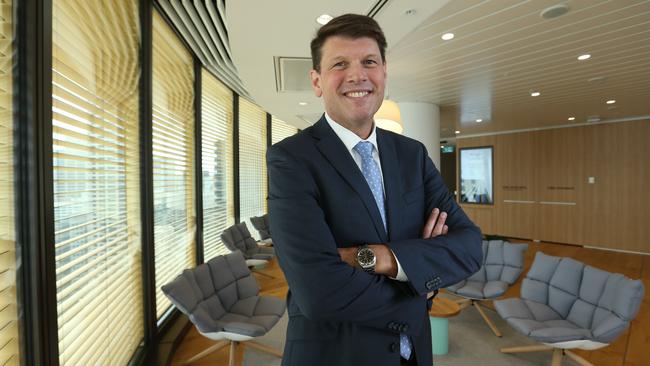Power plays at the top of TransGrid as Paul Italiano departs

This week witnessed yet another energy sector CEO announce an abrupt departure with the resignation of Paul Italiano from infrastructure business TransGrid that operates and manages the high-voltage electricity network in NSW and the ACT.
The board then announced a global search would begin.
In that global search, presumably chairman Jerry Maycock would be mad not to at least consider Brett Redman, his former chief financial officer at AGL while he was chairman of the gentailer. In April, it was Redman who shocked markets by announcing his departure from AGL, having rebuilt the company’s terrible relationship with the federal government and then driven the restructuring of AGL into two separate businesses.
Redman is almost exactly halfway through his notice period at AGL, where he remains an adviser under contract. He is released on October 21.
Redman’s LinkedIn profile describes over 30 years’ experience in senior roles including CEO of large blue-chip industrial companies with expertise in the energy and utilities sector. Add to that an interest in restructuring.
Would Redman be interested in running TransGrid? TransGrid has a close relationship with Spark Infrastructure, which holds a 15 per cent stake in the business. Spark CEO Rick Francis was appointed as the inaugural chair of TransGrid when it was privatised in 2015 and is now deputy chairman to Maycock on the rather large 11-member board (reflecting its other shareholders, Utilities Trust of Australia, two Canadian pension funds, CDPQ and OMERS, and Abu Dhabi’s Tawreed Investments).
Spicing things up, Spark Infrastructure is itself the target of a $5bn takeover bid by private equity firm KKR and yet another Canadian fund, the Ontario Teachers Pension Plan Board, which has been rebuffed this month, but not at all convincingly.
And while Spark’s big assets, Powercor, CitiPower and SA Power are 51 per cent-owned by Hong Kong giant CKI, there is plenty of cash looking for a home among the fundies, enough it seems to need to make some compromise on the buy side.

Before he resigned, Italiano had only recently secured the green light for the $2.2bn 900km EnergyConnect power cable connecting NSW to South Australia.
Once built, EnergyConnect will help South Australia with stabilising its power and transmit plentiful renewable energy into NSW.
TransGrid has also spun off its commercial arm, Lumea, from its regulated business, which will connect the growing solar and wind generation into the grid.
Sources told The Australian that tension had been building between the NSW government and TransGrid in relation to the company’s network upgrades to guard against blackouts.
TransGrid’s business was curbed when its ability to repeal regulator decisions on pricing was banned by the federal government. Whether it was this or other factors that led to Italiano’s departure is unclear.
Taking over as acting CEO is TransGrid executive general manager Brian Salter, who in an earlier life was the AMP legal counsel who also made an abrupt departure in the wake of the financial services royal commission.
At board level, Spark Infrastructure clearly has influence at TransGrid. Let us see what an international search for a new CEO offers up and if a floating senior executive like Redman is in the mix, and if so whether he would take on the role and over what period.
Like it or not, the market is still not entirely satisfied with AGL’s explanation for his departure in May, that “Mr Redman has advised the board that he believed he could not make a long-term commitment beyond the proposed structural separation announced on 30 March 2021”. Since stepping aside, there has been no scandal and AGL has stuck to Redman’s strategy.
Add to this the frisson that a new private equity ownership of Spark would bring to proceedings and there are several moving parts.
In another corner of the energy world, Santos’ active bid for Oil Search, if it succeeds, will surely end up in M&A text books. After the shock departure of Oil Search CEO Keiran Wulff, and a disclosure slip-up by chairman Rick Lee, the board’s hand was weakened and even led to calls that Lee should step down.
No doubt spurred on by Oil Search shareholders, Oil Search has asked Santos to think again on price in the all-scrip bid. The ball is in Santos CEO Kevin Gallagher’s court.
He needs a Goldilocks offer price: one that does not overpay for sound growth assets but one that is enough to allow the Oil Search chairman to deliver what is perceived to be a good deal for investors and that allows the Oil Search board to depart with some dignity.



